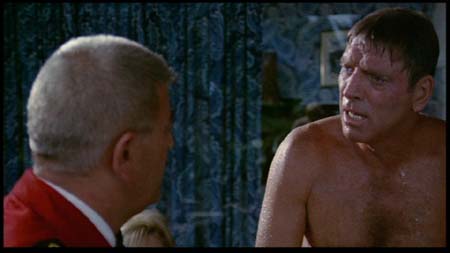The Saddest Movie Ever Made: The Swimmer
 It‘s
It‘s
back! For the triumphant second edition of this column — currently on track
for a blistering quarterly publication schedule — I’ve picked a movie that
couldn’t be more different from the subjects of the first installment. From
Japanese cyberpunk we’re going straight to sixties suburban malaise, courtesy
of Burt Lancaster and The Swimmer.
Don’t worry that I’ve arbitrarily picked this movie from a stack of DVDs. This
one is totally relevant to the situation at hand, and it’s also one of those
near-masterpieces that deserve more love. Based on a story by John Cheever, The
Swimmer is the story of a man who reappears in his old neighborhood,
acting as if nothing has happened, and decides to swim home.


There are
movies that draw you in slowly by putting out a single piece of bait, which is
then dragged step by step back to some place you don’t want to go. The
Swimmer is one of those. It’s definitely not horror, not even what I’d
call a thriller. There’s a mystery here, and a deepening feeling that it’s all
a lie. Think of Blue Velvet, if the whole movie revolved around what caused
Jeffrey’s father’s heart attack. It’s also a memorable, brutally sad movie.
You’re
thinking…what? John Cheever? Not a name associated with great film adaptations.
Then again, neither is Frank Perry, who adapted the story with his wife
Eleanor, who gets screenwriting credit. But Perry’s fascination for dysfunctional
families and Cheever’s with suburbia came together perfectly. In a landscape
where literary adaptations are typically mangled beyond recognition, The
Swimmer is both faithful and adventurous.
Granted,
with a tale that runs a mere ten pages in The
Stories of John Cheever, there shouldn’t be much room to go wrong. But most
of the dialogue, and many of the film’s specific encounters, were invented by
Eleanor Perry for the film. She’s right on the money the entire time, keeping
the tone and intent, but filling out both plot and meaning. There’s evidence to
indicate that Cheever had either Odysseus or Narcissus in mind when he wrote
the story, and Perry’s new opening and the film’s construction cements it.
Summer
fades. Like a lost hero, Ned Merrill appears out of nowhere. He walks straight
onto an old friend’s estate and jumps in the pool as if he owns the place. No
one bats an eye, and a drink is waiting to meet his hand as he rises from the
other end of the pool.
.jpg)
This is
the beginning of a journey across the wealthy spread of Westchester County. Ned
visualizes a crystalline path of water which will take him home. "Pool by
pool, they form a river, all the way to our house. I’ll call it the Lucinda
River, after my wife." For reasons no one can fathom, Ned Merrill wants to
swim home.
But the journey
isn’t as simple as that. Pools mean houses, which mean people. In conversations
with old friends and enemies, there’s this nagging sensation. He stares off
into space and obsesses over the beauty of the day and the water. He’s a
sleepwalker, totally lost inside himself. We join Ned Merrill as his manufactured
reality is in full swing. We don’t watch him create the fantasy life, but we
sure as hell get to watch it crumble.
.jpg)
The
magnificence of The Swimmer is the way that Ned’s own story and realizations
are married to observations about class and race and what happens when
different levels collide. These aren’t grand, shocking revelations, but that
doesn’t make them any less effective. And with every step, Ned moves away from
old, ‘polite’ society and closer to the truth.
Cheever
didn’t have much sympathy for the plight of the social elite, and neither does
this film. In the beginning, the old money families, when faced with Ned’s
awkward appearance, talk about trivialities. Their hangovers, or the tech specs
of a water filter. As he moves on, each encounter reveals more personal details
as the people become less polite. The vulgar new rich talk about their money,
and then it’s broken homes, vaguely antisocial practices and misplaced sexual
desire.
.jpg)
Every
step of the way, it all traces back to some facet of who Ned is, and what
happened to him. When it all comes together, it’s nothing less than the
American Dream gone totally south. Since he appears out of nowhere, and because
so many sequences are touched with the air of dreams, Ned’s failure takes on a
mythic quality. It’s bigger than the fate of a single man.
I feel
like if this movie were made today (see below) that there’d be a shocking twist
reveal to demonstrate that Neddy isn’t all there. But here he comes apart in
layers. The Swimmer is a story told in glances and small movements.
You’ll get as much information out of a couple sideways glances as from any
dialogue. Burt Lancaster is brilliant — golden and muscular at the beginning,
then aged and shivering at the climax.
.jpg)
Everything
isn’t perfect, of course. Here and there, the intentionally oblique photography
veers into absurdity, and a few moments are grandly overplayed, more by Frank
Perry and the editors than Lancaster. In particular, the conclusion is too
grandiose, when a few silent shots would have served perfectly. There are
probably even people who’d write off the film, based on the visual style and
acting technique, which is so late-’60s pop it almost hurts.
There are
also a few moments when Frank Perry and Burt Lancaster seem at odds with one
another. That may be part of the reason Perry eventually walked away from the
picture, leaving the most intense encounter to be directed by a young Sydney
Pollack. (Lancaster was in Pollack’s next movie, Castle Keep, which is
supposedly the film watched by Ronald DeFeo, Jr immediately before killing his
family in a famous Amityville, NY home.)

Those are
squabbles, though. I’ll go on record as saying this is one of the best
marriages of film and prose I’ve seen. In the spectrum of small, forgotten
films, it’s huge.
(I hate to
even touch on this, but it can’t be helped. Rumors have swirled for years about
a remake, and they’ve intensified to the point where Alec Baldwin’s name is
commonly attached to the film. Shudder.)
.jpg)